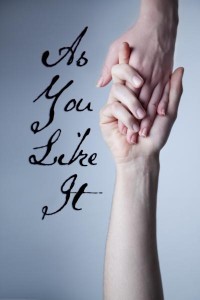As You Like It | Siren Theatre Company
- April 28th, 2011
- Posted in Reviews & Responses
- Write comment

As You Like It. Really! Shakespeare telling me what I like from beyond the grave? I’m offended! How could he assume what I like? How I like my plays? I like my plays fresh and intense and unique. So generally, I don’t selected Shakespeare lightly (as mentioned in my response to Anthony Skuse’s recent Julius Caesar and you can read about that here)… and this is my third production of As You like It. The first was as a teenager sitting amongst the trees of the Coffs Harbour Botanic Gardens (I was 16 I think?) and the one after that was a SUDS production at the Seymour Centre in the late 90s… and now Kate Gaul’s production at Carriageworks. I am fairly familiar with the play – though I am no scholar, I think it’s worth looking at the critics response to this play across time.
George Bernard Shaw claimed that As You Like It was really a pop-sensation – compiling all the bits that audiences like and missed out on being a great piece of writing. Tolstoy was supposedly annoyed at the immorality of the characters. It is not my favourite of Shakespeare’s comedies – I do indeed favour Much Ado About Nothing (and there is a production on, presently, Bell Shakespeare I think, but I wasn’t invited and so like a vampire, I shall not attend)… but As You Like It has some of the great speeches of Shakespeare including “All the World’s a Stage…” But it has a blend of the pastoral romance you can find in Mid Summer’s, the deep/dark melancholy brooding of Hamlet via the character of Jacques, the witty banter of Much Ado and the cross dressing of Twelfth Night – so it covers alot of ground: gender politics, love, life, status, loyalty, marriage, familial obligation.
In the cavernous cold concrete of Carriageworks, Kate Gaul and her band of merry artists has created a beautiful Forest of Arden. Luiz Pampohla’s lights – a mellow multi-coloured festoon, arc up to the ceiling… A patchwork of patchwork quilts hang behind a forest of instruments played (and manipulated) by David Manuel and Daryl Wallis (also credited with composition). There’s a warmth, a homeliness to the show. And the cast – a motley crew of familiar and fresh faces – feel like a family of players who shift and change and transform – clowning and singing (music by Daryl Wallis) and dancing (Courtesy of Natalia Ladyko). Most notably about this particular production is the use of clowning – which essentially highlights the fun and folly in love (the pursuit of AND the maintenance of…). It’s an interesting idea – which allows the performers to transform and tumble in and out of character. For those looking for a soulful reasoning of love – they may be disappointed.
On the opening night I heard much about Vanessa Redgraves performance – but like all whippersnappers who did not see this performance – this is a comparison I can’t make. I am very certain though that Gaul’s production will sit amongst the exclusive 8 productions I will see of this play in my lifetime. For me, in my theatre-going and absorption it is essential to not hold one production above another – but to see what the production we are seeing may offer an audience. I was in a very fortunate situation to have brought to the opening someone who was not familiar with the play – who thoroughly enjoyed the production. And so I think is worth considering about what the play, and what specifically does this production offer the new theatre goer/or student (as I believe this is on the school syllabus)?
Perhaps what Gaul’s production offers is a window into physical fun. Love as fun. Love as foolish and obvious and embarrassing… as clowns are. That all of us are not only merely players, but we are fools for love, fumbling yet magical – and that we all possess that which in the face of love/falling in love/falling on lust makes us seem ridiculous.
It is a handsome and well crafted production, with some genuinely beautiful staging, and exquisite use of light. The performances are clear and have moments of casual flippancy and cuteness, and a robust focus. I don’t like to single out performers in Gaul’s production as I believe she often focuses on creating such a cohesive ensemble – but I particularly was magnetized by Jane Phegan’s Celia – direct and devoted in her love of Rosalind.
What Kate Gaul does is remarkable. And no one else has the stamina, skill, focus and to pull off a production of this scale and this complexity on the resources she has. Though there are aspects of the production which I found counter the tone (for example the dark torch-style songs seemed more in keeping with the tone of Jacques than the uplifting, bubbly love of Orlando), this is a significant production, which I’m sure will find a joyful younger/newer audience thinking more about the value of the diverse four couplings as the curtain is drawn.
Loved it. Too bad we saw it towards the end of the production as I could not tell enough people how terrific it was. The use of body language by the actors was outstanding. Thank you.